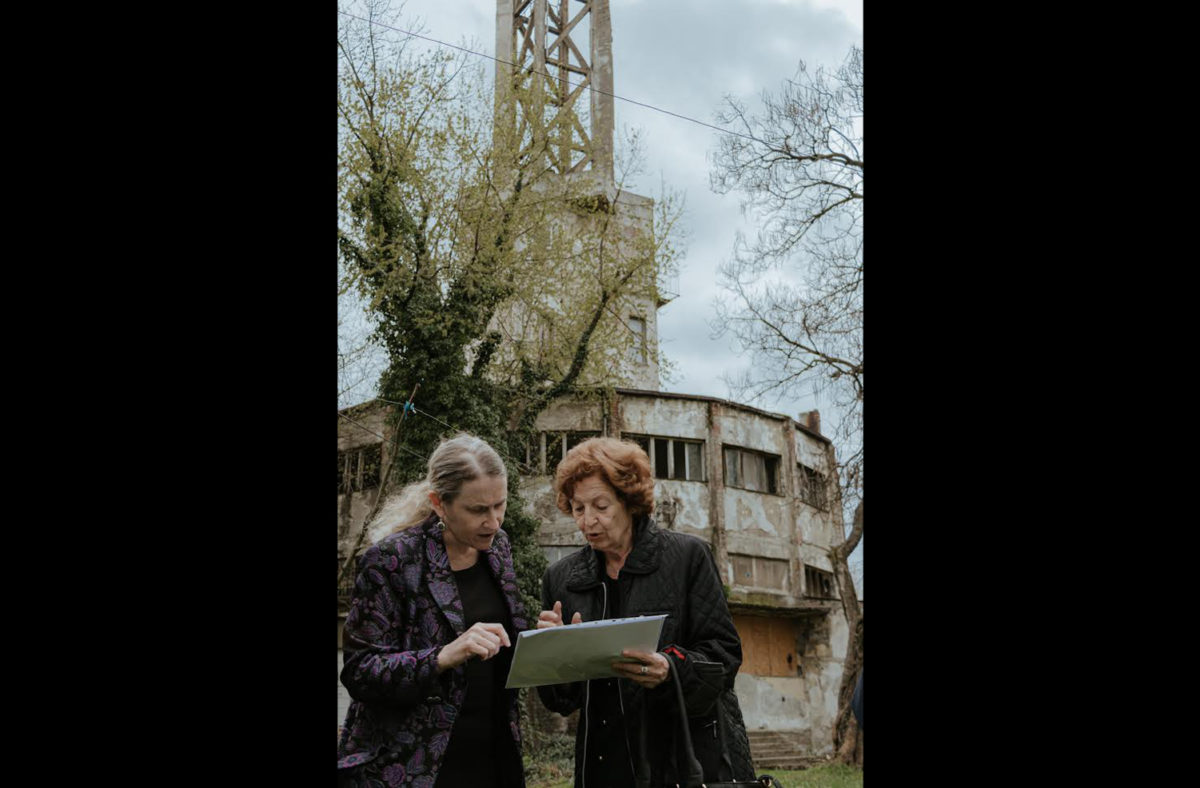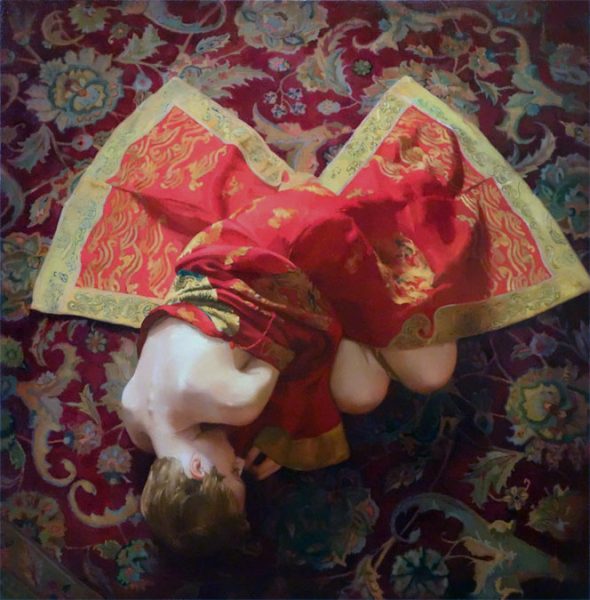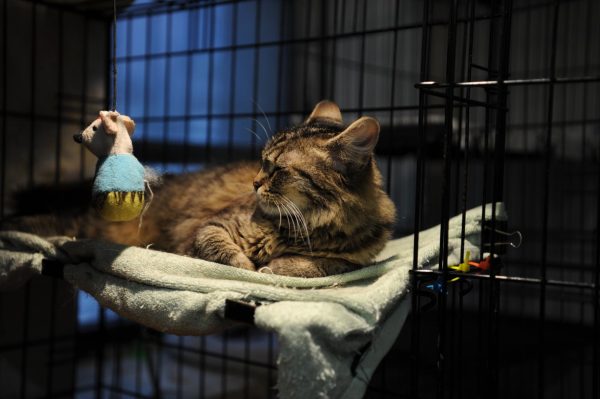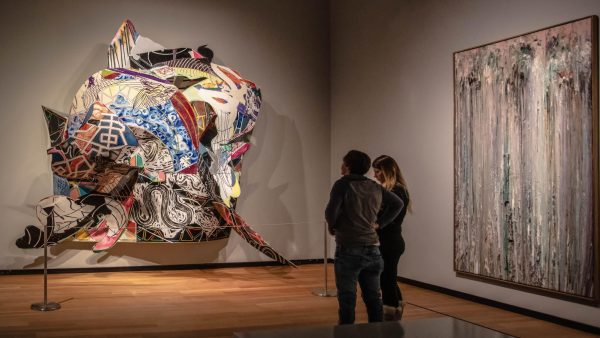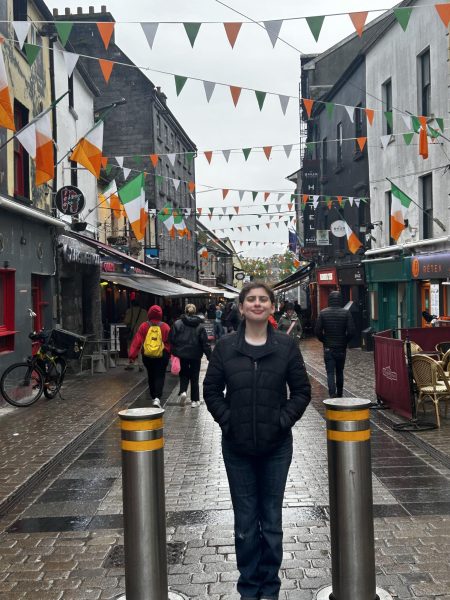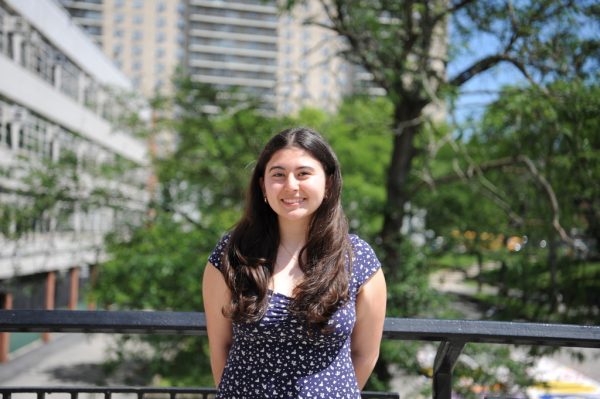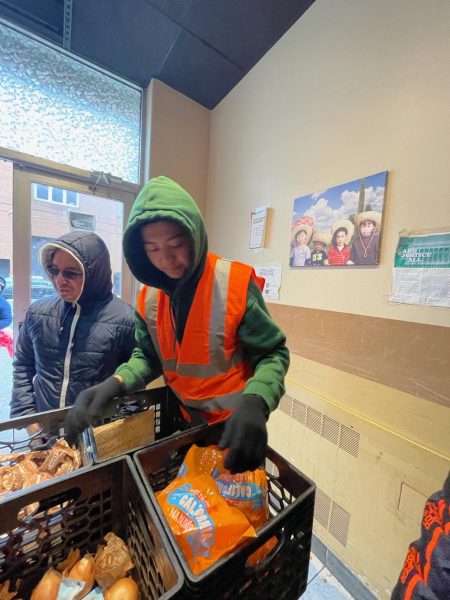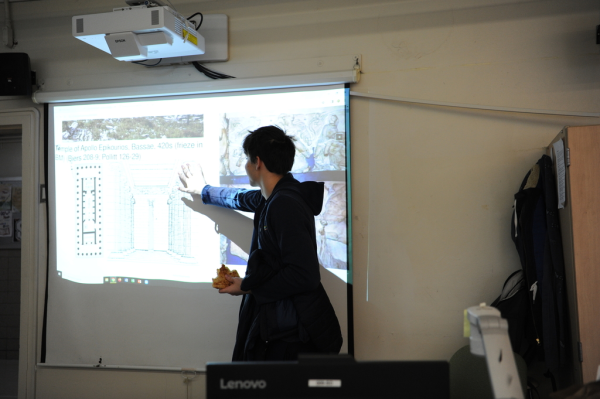Unwavering Commitment: A Profile of Ellen Germain, Special Envoy for Holocaust Issues
An interview with Ellen Germain on her career in the U.S. Department of State and the Foreign Service.
From her office in Washington D.C., career diplomat Ellen Germain spoke to me about her experience in the U.S. Department of State and the numerous positions in which she has served over her 27 years in the Foreign Service. For the past year and a half, Germain has served as the Special Envoy for Holocaust Issues. When this unique position opened up in 2021, Germain knew she had to take it; it combined her interest in genealogy, her Jewish heritage, and her love of interacting with foreign governments and communities.
Growing up in New York City in the 1970s, Germain attended Hunter College High School. She went on to earn a B.A. in English from Stanford University, an M.A. in English from Columbia University, and an MPhil in computer speech and language processing from Cambridge University. In addition to her university education, she has always had an insatiable curiosity about her family history, which has been a quiet motivator for most of her life. This, along with her deep interest in foreign cultures and languages, has served as a strong basis for her successful career. Her passionate commitment to preserving the memory of the Holocaust and educating younger generations about what really happened during one of the darkest chapters in history has made her an especially effective Special Envoy for Holocaust Issues.
Since joining the Foreign Service in 1995, Germain has served in numerous positions, ranging from Senior Political Officer in the Office of Israel-Palestinian Affairs, to Head of the U.S. Consulate General in Krakow, Poland, to Director of the Office of Arabian Peninsula Affairs in the Bureau of Near Eastern Affairs, among others. She has learned a number of new languages as the positions required and has traveled constantly, making Foreign Service in the State Department, “the perfect job for someone with a short attention span,” as she joked.
As State Department employees become more established and gain more agency, they are given more freedom to choose their positions. However, a new position for a Foreign Service officer does not just mean a new job, but often an entirely new country as well. This mobility has given Germain the space to flourish and to explore many different cultures.
Germain and I spoke not only about her position as Special Envoy for Holocaust Issues, but also about her background and how she came to pursue both a job in the Foreign Service and this position in particular.
Q: How many places have you been posted and how have those experiences differed from one another?
“I have been posted in a lot of places. . . Tel Aviv, London, and Moscow.” Germain was the Senior Political Officer in the Office of Israel-Palestinian Affairs, Deputy Director of the Maghreb office (North Africa: Tunisia, Algeria, Morocco, Libya), Deputy Director of the Russian Affairs office, posted to Baghdad for a year, then New York for the U.S. Mission to the United Nations.
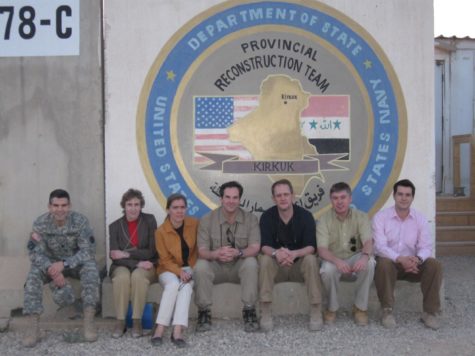
“[The UN] was great, because I had always wanted to do UN multilateral work, and I was back in my hometown.”
After New York, Germain was the Consul General (or Principal Officer) of the U.S. Consulate in Krakow, Poland, then the Director of the Arabian Peninsula Affairs office, which works with the Arab Gulf countries — Saudi Arabia, Yemen, Oman, Bahrain, UAE, Kuwait, and Qatar — based out of Washington. After these positions, Germain was the Deputy Chief of Mission in Sarajevo, in Bosnia-Herzegovina. After 3 years in Bosnia-Herzegovina, Germain moved back to Washington, D.C. to take the position as Special Envoy for Holocaust Issues, which she has been filling for almost two years.
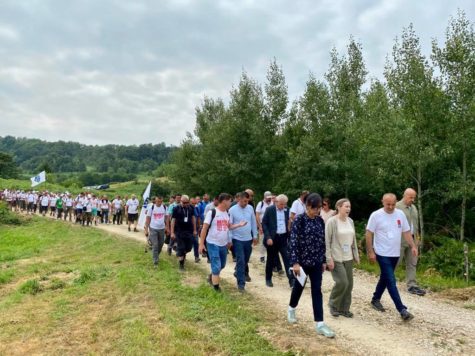
Her time as Deputy Chief of Mission in Sarajevo was especially challenging, as it included the height of the COVID-19 pandemic. While Germain found Sarajevo to be “lovely” — she was particularly drawn to the country’s striking natural beauty, she noted, “the health care system in Bosnia is pretty bad at the best of times . . . We had very complicated, special procedures in place because . . . for three or four months, the borders were closed . . . . [We worked] with the embassy team and people in Washington, to make sure that if we had somebody who got sick, we would be able to fly them out on a medical evacuation.”
Q: How many languages do you speak, and what is the breakdown between time inside the country and international work?
“I studied Russian, then Polish, and Bosnian, or Serbo-Croatian, but when I learn a new language, it kind of takes over the old ones. I studied Hebrew, too.” Germain spent 3 ½ years in language training in Washington in preparation for her positions.
Over her 27 year career, Germain has spent only 8 years working in Washington (excluding her years in language training.) Most of her positions are international. “Most people, including me, think it’s much more fun to be overseas,” she remarked. “If you want to be in the country, there’s civil service. Civil service employees in the State Department don’t go overseas; they are permanently assigned to Washington.”
Q: As you told me, you have a say in your next position within the State Department, so why did you choose to become Special Envoy for Holocaust issues?
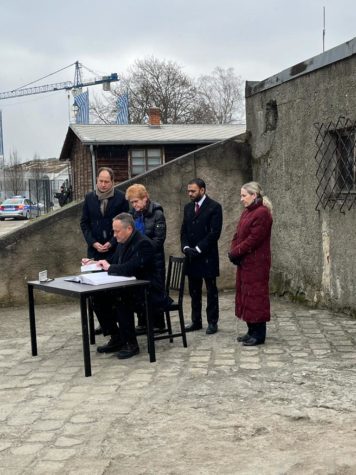
“It’s something that interests me, I care about it, and the idea of being able to work on Holocaust issues in a foreign policy context seemed really interesting, to be able to do something to help survivors and help maintain the accurate, factual memory of the Holocaust. So, getting involved in countering Holocaust denial and distortion all really appealed to me….When I was in Krakow, Krakow was about a 90-minute drive from Auschwitz. In Poland, World War Two and the Holocaust are very present still, even almost 80 years after the end of World War II. And so I had gone to Auschwitz many times, when we had Congresspeople visiting, other VIP visitors, or when I had to talk to people at the museum or the head of Auschwitz. There is a Jewish community, a revived Jewish community in Krakow, and I got to know them very well…. The head of the Jewish Community Center actually went to the same school as me, at Hunter. He has lived in Krakow for 20 years now and is a Polish citizen as well as an American citizen. They are trying to revitalize the Jewish community and build a Jewish future in Krakow. So, I had gotten to know the Jewish communities in Poland quite a bit.”
Germain, having previously worked in Israel at the U.S. Embassy in Tel Aviv, in Washington on the Israel-Palestinian Affairs desk, and in Moscow and Krakow, stated that she “felt like so many of the postings I had already done were relevant and led up to my position of Special Envoy for Holocaust Issues. So, when the job appeared on the list, when I was looking for my next position, I thought ‘Wow, that sounds really interesting and something I’d really love to do!’ I was fortunate and got the job!”
Q: Is this job different from the other ones you have pursued? Can you explain what you do?
“It is, actually. It is very different. It is self-directed and autonomous. As Special Envoy for Holocaust Issues…we only focus on two sets of issues: restitution and supporting accurate Holocaust commemoration and education. Restitution deals with Jewish property that was seized by the Nazis during WWII. . .It’s basically advocating and persuading governments to set up processes that will allow individuals to bring forward their claims and get their land or other property back,” she told me. “We talk to European governments to try to encourage and persuade them to set up a mechanism to pass laws that make it possible for individuals and Jewish communities to file claims for private and communal property, like synagogues, cemeteries, and school buildings. Many governments have done everything they need to do to enable a restitution process, and many countries have a ways to go. There is still a lot of unfinished business all these years later. . . . We are seeking a measure of justice for Holocaust survivors and their heirs.”
In addition to working with foreign governments to return or compensate for Jewish property taken before and during the Holocaust, the Holocaust Issues office works to support accurate Holocaust education and commemoration. This includes “working with foreign governments and international organizations, like the International Holocaust Remembrance Alliance, to counter Holocaust denial and distortion,” Germain said.
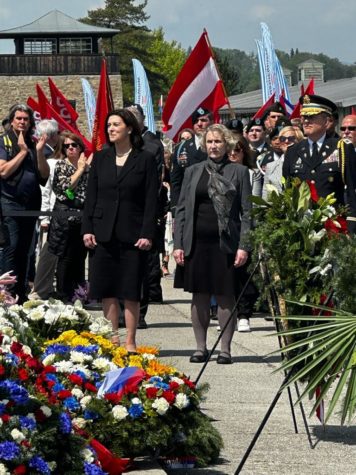
In her current position as Special Envoy, Germain has traveled to many countries, including Poland, Hungary, Croatia, Ukraine, Latvia, and Lithuania. “A lot of it is showing up, going to these countries and talking to them about restitution and honestly confronting what their country did during WWII.” Germain believes that it’s important to “face up to the bad as well as the good in your history,” for both European countries, as well as for the United States. “The United States, and the State Department in particular, did not do a great job at all in helping Jewish refugees trying to flee the Nazis in World War II.” Breckenridge Long, head of immigration policy in the U.S. State Department in the 1930s and 40s, was the mastermind behind a lot of this antisemitic policy, lying to Congress about the number of visas issued, falsifying memos, and delaying ships carrying Jewish refugees.
“It was not a shining moment in the history of the State Department,” Germain said.
Germain’s work is not limited to working with foreign governments. Much of her in-country work involves speaking to groups, explaining what her office does, and why foreign policy and the work of the State Department is important to American citizens. “There’s a lot of public speaking and reaching out to governments and to the public to explain why these issues matter. These are human rights issues as well as legal issues,” she said.
Q: Can you share a memorable or impactful experience you’ve had while working with individuals or communities affected by the Holocaust?
“Pretty much every country that I’ve visited in this job in Eastern or Central Europe has very small Jewish communities, because most of the community was wiped out during World War II. They have all been deeply affected by World War II and the Holocaust,” she said.
Germain attended the 120th-anniversary commemoration of a devastating pogrom that occurred in Kishiniev (now called Chisinau), Moldova in 1903. Though the country does not have a lot of resources she was, “incredibly impressed because . . . they are committed to maintaining Jewish life there and trying to get back four synagogue sites. It really inspired me to see how much energy they are putting into it.”
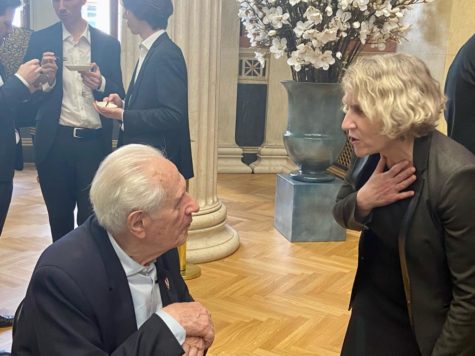
Similarly, when hearing the stories of survivors, Germain continues to be moved. “It always strikes me . . .no matter how many times I hear survivors’ stories, it is always something different and incredibly meaningful. I just hope that no matter how often we hear them, we never get hardened to it. [I believe that] we also have to ensure that survivors get support for home health care because many survivors obviously are very frail. And that, really to me, is what makes me feel like we’re having some effect.”
Germain feels passionate about her role in a personal sense as well. Though most of her family came to the United States from Russia in the early 1900s, quite a few of her grandmother’s aunts and uncles, and cousins were still in Poland and murdered during the Holocaust. “So, there’s a distant, but personal, piece of it for me. I started doing genealogy research back in the 1990s on my family in Poland, Russia, and Belarus . . . [and have tried to] kind of, retrieve, or honor their memories in some way.”
Germain has been fascinated by her family history for as long as she can remember. She told me, “I was always interested in the family stories, even as a little kid. I was always the one who was asking my grandmother ‘Who is this in the old photographs?’ and ‘Tell me the stories.’ I think, after my mother died, I just got more interested in it.”
“It’s like detective work, like trying to put together a jigsaw puzzle. . . [The] puzzle aspect of it is really interesting to me. And the fact that you can get a sense of history in a personal way,” Germain continued.
Q: Has your current position helped you with this genealogy work, or given you any new insights?
“This job has certainly given me insight into all the resources available and the different sources of information about the Holocaust, like the records and archives . . . It has given me an opportunity to really be a part of some of these institutions and see how they function. I have a huge admiration for all the people who work on these issues; they are just really dedicated and really passionate about what they do. It’s impressive and heartwarming,” Germain told me.
Germain expressed to me that her Jewish background has influenced her in subconscious ways, shaping her interest in her family history and making Israel and Poland more appealing opportunities, but this has never influenced her directly or overtly. “My personal experience always affects what I’m interested in, but I think that’s true of everybody,” she states.
Q: Looking ahead, what do you hope to achieve or contribute to this field? Through any position in the State Department, but especially Holocaust commemoration in the coming years?
As our conversation transitioned into impact, Germain told me that she’d, “really like to feel as if I made a bit of a contribution in making sure that history of the Holocaust does not get distorted. I feel like there’s so much disinformation swirling around these days, and so much disinformation and outright lying about history.…The truth really matters, and if we can’t be honest about our histories, the bad and the good, I feel like there’s no hope.. . . I’m just really trying to do however much I can to really strengthen accurate history of the Holocaust, accurate commemoration, and accurate education.”
Q: What would you say to students and people who find Holocaust commemoration important?
“When I hear distortions or efforts to downplay what happened during World War II, I try to encourage other people to speak out, including students. The future is in your hands! So, speaking out really matters.”
Q: What would you say to people hoping to pursue a career in the State Department?
Germain is an enthusiastic supporter of careers in the Foreign Service. It’s a field she feels students should “absolutely think about pursuing,” adding, “It’s a great career and I just love it! If you go to www.state.gov there’s a little button for jobs and it’ll explain all about the Foreign Service exam process.
There are so many different jobs in the Foreign Service, you can do almost anything. I’m sad because there are so many things that I would like to do that I haven’t had the chance to do. I’ve loved every position that I’ve had. It’s a great career for anyone who’s interested in foreign affairs, languages, or foreign travel. It’s not all foreign policy; it’s also cultural diplomacy and cultural exchanges, things like that. In fact, when I first joined the Foreign Service, I thought I would focus on science and technology policy. So there’s a lot of opportunity.”
Q: Any final bits of advice?
“For those who care about Holocaust issues and Holocaust commemoration and education, my message is stand strong and speak out in support of the truth and against Holocaust distortion. We need strong voices remembering the accurate history of the Holocaust.”
“There is so much disinformation and outright lying about history .…The truth really matters, and if we can’t be honest about our histories, the bad and the good, I feel like there’s no hope.. . . I’m just really trying to do however much I can to really strengthen accurate history of the Holocaust, accurate commemoration, and accurate education.”
Yardena Franklin is a Graphic Designer and Copy Chief for ‘The Observatory’ yearbook, as well as a Staff Reporter for ‘The Science Survey’ newspaper....

